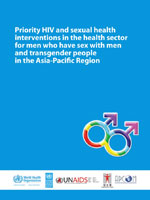
Feature Story
Report calls for urgent scale-up of MSM strategies to prevent HIV in Asia Pacific
28 May 2010
28 May 2010 28 May 2010
A report on HIV among men who have sex with men and transgender people in the Asia-Pacific region has called for urgent scale-up of strategies to prevent the transmission of HIV, and to ensure greater access to treatment, care and support for those already in need.
Titled “Priority HIV and sexual health interventions in the health sector for men who have sex with men and transgender people in the Asia-Pacific Region”, the report was developed after a meeting held in Hong Kong in February 2009, organized by WHO Regional Office for the Western Pacific, UNDP, UNAIDS and the Department of Health of Hong Kong.
The context of the report is important as it comes at the back of two similar reports—by the Commission on AIDS in Asia and by the Commission on AIDS in the Pacific—recommending that the control of the HIV epidemic in the region would imply focusing on the most-at-risk populations, including men who have sex with men (MSM) and transgender persons (TG).
The HIV epidemic among MSM and TG is escalating globally and in Asia, MSM are disproportionately affected by it, with the odds of MSM having HIV infection being 18.7 times higher than that in the general population, the report states. The Asian Epidemic Model projects that unless effective prevention measures are intensified, by 2020, around 46% of new infections in Asia will be among MSM, up from 13% in 2008.
The report lays great emphasis on repealing laws by parliament or decisions by courts that violate the constitutional rights of MSM. Male-to-male sexual behaviour remains a criminal offence in 18 Asia-Pacific countries, contributing directly to the stigma associated with male-to-male sex and driving MSM underground, making it more difficult for prevention programmes to reach them.
To counter difficulties in motivating health workers and reducing stigma and discrimination, the report recommends sensitizing health workers to work with people living with HIV, including MSM and TG; and recruiting MSM and TG into healthcare positions.
The report recommends for the involvement of MSM in community responses to HIV through self-organization. MSM should be given supportive access to the full range of services in which staff are sensitized to their issues and needs. Peer support and counselling should be actively encouraged, it states.
National health sector strategies and plans should call for the engagement of civil society and MSM and TG community based organisations in strategic planning, programme development, implementation, monitoring and evaluation.
Finally, the report recommends involving WHO, United Nations Development Programme (UNDP), UNAIDS, United Nations Educational, Scientific and Cultural Organization (UNESCO) and the Asia Pacific Coalition on Male Sexual Health (APCOM) in all aspects of planning, implementing, monitoring and evaluating health sector responses to HIV at the global, regional, national and local levels.
Report calls for urgent scale-up of MSM strategie
Key populations:
Cosponsors:
World Health Organization
United Nations Development Programme
Feature stories:
Punitive laws limit access to HIV prevention and care services in Asia Pacific (21 May 2010)
HIV prevention hampered by homophobia
(13 January 2009)
External links:
Department of Health of Hong Kong
Commission on AIDS in the Pacific
Publications:
Priority HIV and sexual health interventions in the health sector for men who have sex with men and transgender people in the
Asia-Pacific Region (pdf, 1.84 Mb.)
Turning the tide: An open strategy for a response to AIDS in the Pacific. Report of the Commission on AIDS in the Pacific (pdf,
1.52 Mb.)
HIV and Men who have Sex with Men in Asia and the Pacific (pdf, 1.11 Mb.)



